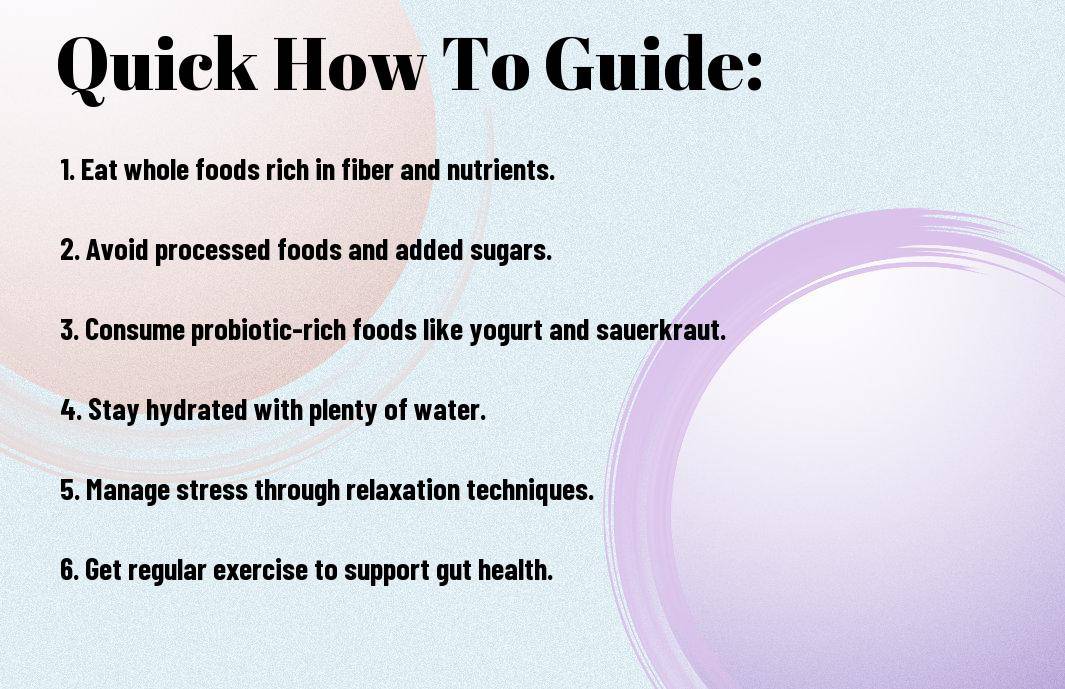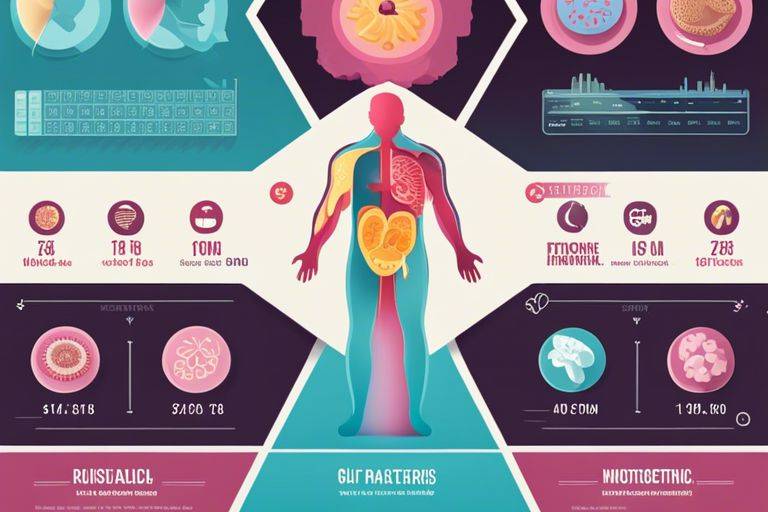Overwhelmed by digestive issues? I know how challenging it can be to deal with uncomfortable symptoms such as bloating, gas, and irregularity. In this comprehensive guide, I will walk you through natural and effective methods to heal your gut and improve your digestive health. From nutrient-rich foods to probiotics and lifestyle changes, I will cover everything you need to know to get your gut back on track.

Key Takeaways:
- Eat a diverse range of foods: Including fruits, vegetables, whole grains, and healthy fats can promote a healthy gut microbiome.
- Avoid processed foods: These can disrupt the balance of bacteria in your gut and contribute to inflammation.
- Stay hydrated: Drinking plenty of water can help maintain good digestion and promote overall gut health.
- Manage stress: Chronic stress can impact gut health, so incorporating stress-reducing activities like meditation or yoga can be beneficial.
- Include probiotics and prebiotics: Consuming foods rich in probiotics (like yogurt) and prebiotics (like bananas and onions) can help support a healthy gut flora.
- Get enough sleep: Lack of sleep can disrupt gut health, so aim for 7-9 hours of quality sleep each night.
- Consider supplements: In some cases, probiotic supplements or other gut-healing supplements may be beneficial, but always consult with a healthcare provider before starting a new supplement regimen.

Understanding Gut Health
What is Gut Health and Why is it Important?
The gut, also known as the gastrointestinal tract, plays a crucial role in overall health. It is responsible for digesting food, absorbing nutrients, and eliminating waste. Good gut health is important for a strong immune system, proper digestion, and even mental health. When the gut is imbalanced, it can lead to various health issues.
Common Signs and Symptoms of Gut Imbalance
If you are experiencing digestive issues, bloating, gas, fatigue, skin problems, or frequent infections, you may have an imbalance in your gut flora. These symptoms are your body’s way of telling you that your gut health needs attention.
Signs of gut imbalance can manifest in many ways, affecting not only your digestion but also your immune system and mental well-being. It’s important to pay attention to these symptoms and take steps to improve your gut health to prevent more serious health issues in the future.

Factors Affecting Gut Health
Clearly, the health of your gut is influenced by various factors, including diet and nutrition, stress levels, and exposure to environmental toxins. These factors can either promote a healthy gut environment or disrupt the delicate balance of your digestive system. Any imbalances can lead to digestive issues, inflammation, and other health problems.
Diet and Nutrition: How Food Choices Impact Gut Health
Little do you realize that what you eat plays a crucial role in maintaining your gut health. Your diet directly impacts the diversity of your gut microbiota, affecting your overall digestive wellness. Consuming a variety of nutrient-dense foods rich in fiber and probiotics can support a healthy gut environment.
Stress and Gut Health: The Connection Explained
The connection between stress and gut health is undeniable. Stress can disrupt the balance of your gut microbiota, leading to digestive discomfort and inflammation. Psychological stress can manifest physically in your gut, impacting digestion and overall gut function.
Plus, chronic stress can weaken the intestinal barrier, making your gut more susceptible to pathogens and inflammatory substances that can harm your digestive health.
Environmental Toxins and Gut Health: What You Need to Know
Environmental factors like pollution, pesticides, and heavy metals can also impact your gut health. These toxins can disrupt the balance of your gut microbiota and contribute to inflammation and digestive issues. It’s necessary to limit your exposure to environmental toxins to protect your gut and overall health.

How to Heal Your Gut Naturally
After understanding the importance of gut health and its impact on overall well-being, I have compiled a comprehensive guide on how to heal your gut naturally. By making simple yet effective changes to your lifestyle and diet, you can support your gut health and improve your quality of life.
Tip 1: Eat a Balanced Diet Rich in Fiber and Probiotics
For a healthy gut, I recommend incorporating fiber-rich foods like fruits, vegetables, whole grains, and legumes, as they help promote good digestion and overall gut health. Additionally, including probiotic-rich foods like yogurt, kefir, sauerkraut, and kimchi can introduce beneficial bacteria to your gut, further supporting its health.
Tip 2: Stay Hydrated and Manage Stress Effectively
With a busy lifestyle, it’s crucial to stay hydrated as water plays a significant role in digestion and nutrient absorption. Furthermore, managing stress effectively through practices like meditation, yoga, or deep breathing exercises can help reduce gut inflammation and promote a healthier microbiome.
Another crucial aspect of managing stress is to ensure you get enough quality sleep, as sleep deprivation can negatively impact your gut health. Aim for 7-9 hours of quality sleep each night to support a healthy gut.
Tip 3: Incorporate Gut-Friendly Foods into Your Diet
You can further enhance your gut health by incorporating gut-friendly foods like bone broth, ginger, turmeric, garlic, and almonds into your daily meals. These foods have anti-inflammatory properties and can help nourish and heal your gut lining, promoting better digestion and overall gut health.
Natural Remedies for Gut Health
Once again, if you are looking to naturally heal your gut, I recommend following the 10 Steps To Heal Your Gut Naturally guide. In addition to dietary changes, there are several natural remedies you can incorporate to support your gut health.
Probiotics: The Benefits and How to Choose the Right One
With probiotics, you can introduce **beneficial bacteria** to your gut, which can aid in digestion and overall gut health. When choosing a probiotic supplement, look for **strains** that are well-researched and have **adequate colony-forming units (CFUs)** to ensure effectiveness.
Prebiotics: What They Are and How They Support Gut Health
If you are wondering about prebiotics, they are **non-digestible fibers** that **promote the growth** of beneficial bacteria in your gut. You can find prebiotics in **foods** like **garlic**, **onions**, **bananas**, and **asparagus**. Including these foods in your diet can help **nourish** the good bacteria in your gut.
Herbal Remedies for Gut Health: A Guide
With herbal remedies, you can **support** your gut health in a natural way. **Herbs** like **ginger**, **peppermint**, and **turmeric** have **anti-inflammatory** and **digestive properties** that can benefit your gut. Incorporating these herbs into your diet or as supplements can help **calm** digestive issues and **promote** overall gut health.
Lifestyle Changes for a Healthy Gut
How to Create a Gut-Friendly Environment at Home
One of the first steps I recommend to promote a healthy gut is creating a gut-friendly environment at home. This includes reducing stress levels, incorporating plenty of plants into your living space, and avoiding harsh chemicals that can disrupt the balance of your gut microbiome.
Exercise and Gut Health: The Surprising Connection
Home exercise routines can have a significant impact on your gut health. By engaging in regular physical activity, you can improve digestion, reduce inflammation, and promote diversity in your gut microbiota.
Connection: When you exercise, you stimulate the production of short-chain fatty acids, which are beneficial for your gut lining. This can help reduce the risk of leaky gut syndrome and other digestive issues.
Getting Enough Sleep: Why It’s Crucial for Gut Health
Crucial for your gut health is ensuring you get enough quality sleep. During sleep, your body undergoes imperative repair processes, including the maintenance of a healthy gut lining and the regulation of gut microbiota.
Another reason why sleep is crucial for gut health is that inadequate sleep can lead to an imbalance in hunger hormones, increased stress levels, and a weakened immune system, all of which can negatively impact your gut health.
Managing Gut Health Conditions Naturally
Your gut health is vital for overall well-being. You can learn more about maintaining a healthy gut by visiting Gut health. Here are some natural ways to manage common gut health conditions.
Natural Remedies for IBS (Irritable Bowel Syndrome)
Little changes can make a big difference when managing IBS. Incorporating stress-reducing activities like yoga and meditation, as well as dietary adjustments like avoiding trigger foods, can help alleviate symptoms.
How to Manage Leaky Gut Syndrome Naturally
On top of following a gut-friendly diet rich in fiber and probiotics, I find it crucial to reduce stress levels and ensure adequate sleep to support gut healing. Additionally, identifying and eliminating food sensitivities can play a significant role in managing leaky gut syndrome.
Natural Solutions for Candida Overgrowth
Little adjustments in your diet and lifestyle can help combat candida overgrowth. To effectively address candida, focus on reducing sugar intake, incorporating antifungal foods like garlic and coconut oil, and considering probiotic supplements to restore a healthy balance in the gut.
Conclusion
So, after learning about the various ways to heal your gut naturally, I encourage you to take the necessary steps to improve your gut health. Recall, a healthy gut plays a crucial role in your overall well-being. For more information, check out How to Heal My Gut Naturally: The Comprehensive Guide.
FAQ
Q: What are some common symptoms of an unhealthy gut?
A: Some common symptoms of an unhealthy gut include bloating, gas, diarrhea, constipation, food intolerances, and frequent infections.
Q: How can I improve my gut health naturally?
A: You can improve your gut health naturally by eating a diverse range of whole foods, incorporating probiotic-rich foods into your diet, managing stress levels, staying hydrated, and getting regular exercise.
Q: Are there any specific foods that can help heal your gut?
A: Yes, foods like yogurt, kefir, sauerkraut, kimchi, and kombucha are rich in probiotics and can help promote a healthy gut microbiome.
Q: What are some lifestyle changes that can support gut health?
A: Lifestyle changes that can support gut health include getting enough sleep, reducing stress levels, avoiding unnecessary antibiotic use, and staying hydrated.
Q: Can supplements help in healing the gut naturally?
A: Yes, certain supplements like probiotics, prebiotics, digestive enzymes, and L-glutamine can help support a healthy gut and aid in healing naturally.
Q: How long does it take to heal your gut naturally?
A: The time it takes to heal your gut naturally can vary depending on the severity of gut issues and the individual’s overall health. It may take anywhere from a few weeks to several months to see significant improvements.
Q: Are there any specific medical conditions that can impact gut health?
A: Yes, conditions like irritable bowel syndrome (IBS), inflammatory bowel disease (IBD), celiac disease, and leaky gut syndrome can all impact gut health and may require special dietary and lifestyle modifications for management.



